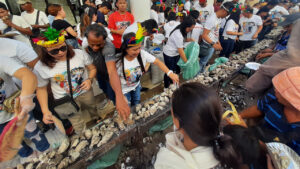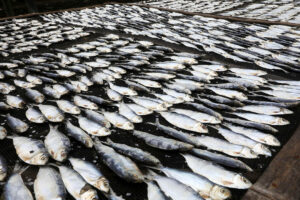Slipping in oil

Expect oily issues to remain on top of the agenda in this Chinese year of the Water Tiger. After all, oil always floats on top of water. It is bad enough that oil and fuel prices have almost doubled since the start of the year, pushing inflation to 4% in March on the back of higher food prices, among other things. Now, edible oil is about to take a major hit as well.
Indonesia, the world’s largest exporter of palm oil, announced recently a calibrated ban on exports to address a domestic shortage. This led to a sudden rise in world prices for edible oils such as palm, soybean, and olive oil. Reuters though reports that the ban may not last more than a few months for lack of storage facilities in Indonesia to store surplus oil.
Moreover, Reuters quoted industry officials as saying that Indonesia was facing mounting pressure from global buyers to resume shipments. The ban, it was later clarified, will apply only to “exports of refined, bleached, and deodorized (RBD) palm olein… and would not affect flows of crude palm oil or other forms of derivative products,” Reuters reported.
The export ban is intended to address a domestic shortage in cooking oil. But in trying to appease consumers by diverting supply, in the hope of lowering local cooking oil prices, Indonesia may also end up hurting its farmers, millers, and refiners. Reuters noted that palm oil producers and processors typically export over twice as much palm oil as is consumed locally.
The implication of the Indonesia ban, especially if prolonged, can be far-reaching. Palm oil is said to be the most used vegetable oil worldwide, while RBD palm oil is the main raw ingredient in the production of cooking oil. Other than food products, palm oil also goes into cosmetics, detergents, and soap, and is an ingredient in the production of biodiesel.
Many staples like bread and pasta also make extensive use of edible palm oil in their production. With wheat prices already having gone up because of the Russia-Ukraine issue, both of which export more than a quarter of the world’s wheat, globally bread and noodle and packaged food manufacturers and consumers have taken a hit.
While the transportation sector is now struggling with high fuel prices, they appear to be coping. So are many motorists. Moreover, with the recent enactment of Republic Act 11697 or the Electric Vehicle Industry Development Act, the stage is set for the development of electric vehicles particularly for public transportation.
The issue with food-grade or edible oil, however, requires a more comprehensive approach to food security. Simply put, the average annual agricultural sector growth should always be significantly higher than average population growth. Otherwise, agriculture will always have to play catch up just to meet the food needs of a growing population.
In recent years, we have had to deal with numerous periodic food shortages. First it was rice, which was saddled with controversies on importation and rice tariffication, and then it was pork, which was affected by the spread of African Swine Fever. In the last six years, we have also had to deal with issues affecting chicken and vegetable production.
In the May 2022 election, I truly believe that food security should be the priority. Above anything else. Not just public health and the economy, but also more focus on food. Food supply has always been problematic because of bottlenecks that drive up prices. Add to this the matters beyond our control like rising world prices for fuel oil and edible oil.
We do not produce enough of our own food and thus rely heavily on foreign suppliers. Most of our imports are raw materials and intermediate goods, as well as capital goods used as inputs for production. Main imported commodity groups include cereals and cereal preparations; mineral fuels, lubricants and related materials; and, other food and live animals.
The Philippines does not produce its own wheat for bread and noodles, and thus regularly imports a big amount of wheat and cereals for food production. And with instant noodles, in particular, having become a cheap source of daily sustenance for the poor, the country’s import bill for bread and noodles production have also been going up.
In addition to cereals, to address seasonal shortages in food supply caused by poor harvests or the closure of fishing areas to allow for breeding, we have also had to import rice as well as frozen fish; chicken, pork, and beef; vegetables and fruits; dairy products and cheese products; processed food, and other food items.
We are obviously unprepared to locally produce sufficient food for our people. But it is not always that we can import what we need, like when the government’s attempts to buy rice from abroad had all been rejected in numerous biddings because of low price offers. Importing food requires that there is food to import; and, there is money to pay for imported food.
But there are instances when other countries need to prioritize their own domestic market, like in Indonesia’s case with palm oil, especially when harvest or food supply is affected by weather disturbances or other factors. The Philippines might have money to buy imported food, but if nobody would sell to it, then we would be in trouble.
Shortages result in price surges and, ultimately, hunger. Above anything else, we need to focus on policies and programs that improve food production. Almost everybody around the world is now either grappling with food supply issues or is working to mitigate supply problems by initiating projects and programs that can boost food production and supply. We should do the same here, if not more extensively, considering our over 100 million-strong population.
We need long-term solutions to feeding problems. We need more farm- and food-related programs that actually work. Programs, projects, and policies that will actually boost food supply and keep food prices down. After all, what would be the point in improving the supply of expensive rather than affordable food items? We need cheap but filling bread, not fancy and expensive cake.
Marvin Tort is a former managing editor of BusinessWorld, and a former chairman of the Philippine Press Council




